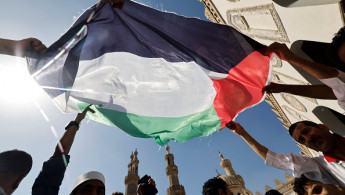Egypt's Azhar voices support for South Africa's ICJ genocide case against Israel
Egypt's Al-Azhar institution has voiced full support for South Africa in its International Court of Justice (ICJ) ongoing case against Israel, which accuses it of committing genocide against the Palestinians.
In a statement released on Thursday, 11 January, the Cairo-based Azhar, also the region's highest Sunni Islamic authority, said that "South Africa's stance reflected the will of the free world and the human conscience, rejecting the atrocities committed by Israel against innocent Palestinians."
Azhar further called on the world to mobilise efforts and join this "crucial quest" by adopting similar firm stances "to halt the flow of innocent blood."
The ICJ's two-day hearing kicked off on Thursday and will continue throughout Friday in response to an emergency request by South Africa in the form of an 84-page application accusing Israel of committing genocide against the Palestinians in Gaza.
Meanwhile, the Egyptian government has remained impartial towards the South African legal pursuit, prompting activists, political parties, and professional syndicates to urge Egypt to enforce decisive measures under the UN Genocide Convention.'
Azhar and Egyptian President Abdel Fattah al-Sisi are known to have been at loggerheads over religious views and interpretations.
Egypt's proximity to and historical relationship with the Gaza Strip, as well as its relations with Israel, have given Cairo a pivotal role in the region's affairs.
At least 23,000 Palestinians have been killed and about 60,000 wounded since Israel launched its war on Gaza in October last year.
"The [South African legal] committee's statements before [ICJ] strongly expressed our sentiments and those of the free world in slamming the hideous violations and… crimes committed by the [Israeli] occupation against the people of Gaza," Azhar's statement read.
Egypt and Israel have technically been at peace since the late 1970s, sharing solid diplomatic, economic, and security ties – despite widespread opposition from the Egyptian public.





 Follow the Middle East's top stories in English at The New Arab on Google News
Follow the Middle East's top stories in English at The New Arab on Google News


